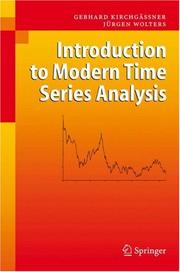| Listing 1 - 4 of 4 |
Sort by
|

ISBN: 1281066400 9786611066406 3540732918 354073290X 3540687351 Year: 2007 Publisher: Berlin, Heidelberg : Springer Berlin Heidelberg : Imprint: Springer,
Abstract | Keywords | Export | Availability | Bookmark
 Loading...
Loading...Choose an application
- Reference Manager
- EndNote
- RefWorks (Direct export to RefWorks)
This book presents modern developments in time series econometrics that are applied to macroeconomic and financial time series. It attempts to bridge the gap between methods and realistic applications. This book contains the most important approaches to analyse time series which may be stationary or nonstationary. Modelling and forecasting univariate time series is the starting point. For multiple stationary time series Granger causality tests and vector autoregressive models are presented. For real applied work the modelling of nonstationary uni- or multivariate time series is most important.
Time-series analysis. --- Analysis of time series --- Autocorrelation (Statistics) --- Harmonic analysis --- Mathematical statistics --- Probabilities --- Econometrics. --- Statistics. --- Statistics for Business, Management, Economics, Finance, Insurance. --- Economics, Mathematical --- Statistics --- Statistical analysis --- Statistical data --- Statistical methods --- Statistical science --- Mathematics --- Econometrics --- Statistics .
Digital
ISBN: 9783540732914 Year: 2007 Publisher: Berlin, Heidelberg Springer-Verlag Berlin Heidelberg
Abstract | Keywords | Export | Availability | Bookmark
 Loading...
Loading...Choose an application
- Reference Manager
- EndNote
- RefWorks (Direct export to RefWorks)
Quantitative methods (economics) --- Mathematical statistics --- Business economics --- time series analysis --- statistiek --- econometrie

ISBN: 9783540732907 Year: 2007 Publisher: Berlin Springer
Abstract | Keywords | Export | Availability | Bookmark
 Loading...
Loading...Choose an application
- Reference Manager
- EndNote
- RefWorks (Direct export to RefWorks)
Book
ISBN: 9783540732914 Year: 2007 Publisher: Berlin Heidelberg Springer Berlin Heidelberg
Abstract | Keywords | Export | Availability | Bookmark
 Loading...
Loading...Choose an application
- Reference Manager
- EndNote
- RefWorks (Direct export to RefWorks)
toModernTime SeriesAnalysis With43Figuresand17Tables 123 ProfessorDr.GebhardKirchgässner UniversityofSt.Gallen SIAW-HSG Bodanstrasse8 CH-9000St.Gallen Switzerland Gebhard.Kirchgaessner@unisg.ch ProfessorDr.JürgenWolters FreieUniversitätBerlin InstituteforStatisticsandEconometrics Boltzmannstraße20 14195Berlin Germany wolters@wiwiss.fu-berlin.de LibraryofCongressControl Number:2007932230 ISBN978-3-540-73290-7 SpringerBerlinHeidelbergNewYork Thisworkissubjecttocopyright.Allrightsarereserved,whetherthewholeorpartofthematerial is concerned, specifically the rights of translation, reprinting, reuse of illustrations, recitation, broadcasting,reproductiononmicrofilmorinanyotherway,andstorageindatabanks.Duplication ofthispublicationorpartsthereofispermittedonlyundertheprovisionsoftheGermanCopyright Law of September 9, 1965, inits current version, andpermission for usemustalways beobtained fromSpringer.ViolationsareliabletoprosecutionundertheGermanCopyrightLaw. SpringerisapartofSpringerScience+BusinessMedia springer.com ©Springer-VerlagBerlinHeidelberg2007 The use of general descriptive names, registered names, trademarks, etc. in this publication does notimply,evenintheabsenceofaspecificstatement,thatsuchnamesareexemptfromtherelevant protectivelawsandregulationsandthereforefreeforgeneraluse. Production:LE-TXJelonek,Schmidt&VöcklerGbR,Leipzig E Cover-design:WMXDesignGmbH,Heidelberg SPIN12071654 42/3180YL-543210 Printedonacid-freepaper Preface Econometrics has been developing rapidly over the past four decades. This is not only true for microeconometrics which more or less originated during this period, but also for time series econometrics where the cointegration revolution influenced applied work in a substantial manner. Economists have been using time series for a very long time. Since the 1930s when econometrics became an own subject, researchers have mainly worked with time series. However, economists as well as econometricians did not really care about the statistical properties of time series. This attitude started to change in 1970 with the publication of the textbook Time Series Analysis, Forecasting and Control by GEORGE E.P. BOX and GWILYM M. JENKINS. The main impact, however, stems from the work of CLIVE W.J. GRANGER starting in the 1960s. In 2003 together with ROBERT W. ENGLE, he received the Nobel Prize in Economics for his work.
Quantitative methods (economics) --- Mathematical statistics --- Business economics --- time series analysis --- statistiek --- econometrie
| Listing 1 - 4 of 4 |
Sort by
|

 Search
Search Feedback
Feedback About
About Help
Help News
News